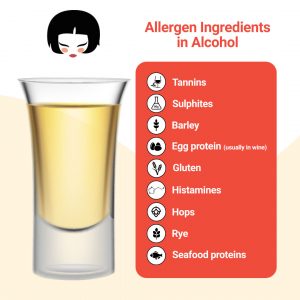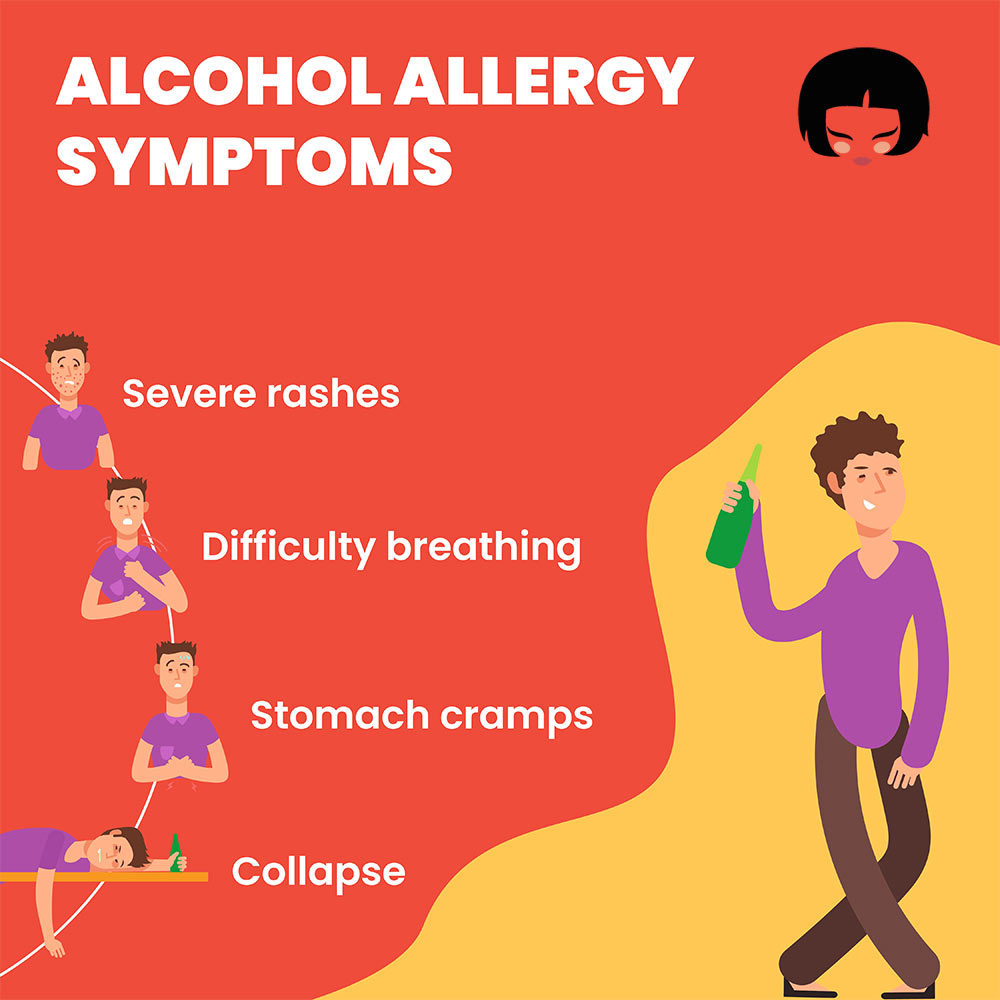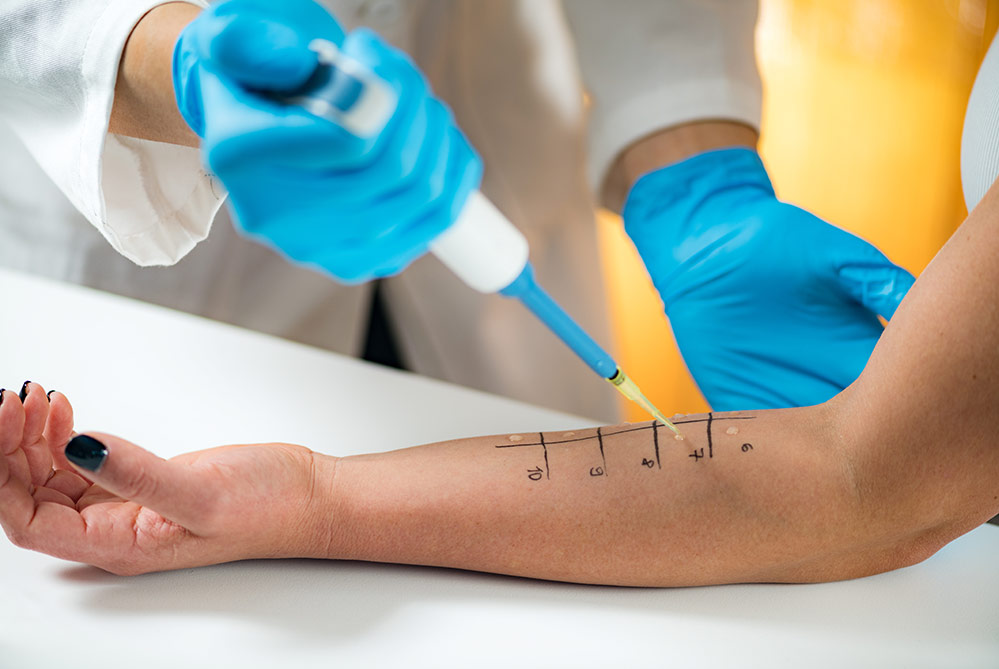When many Asians have an alcoholic drink, even just a sip, they may experience really negative symptoms. Some may think they have an allergy to alcohol, but here’s why that’s probably not true.
Do you have an Alcohol Allergy?
An allergy to alcohol is very rare. It’s certainly not seen at the same scale as more common allergies like nuts, shellfish or animal dander. But just because it’s rare, doesn’t mean that alcohol allergies don’t exist at all.
One study (although small) found that 7.2 percent of participants reported experiencing “allergy-like symptoms after drinking wine.” However, only two of the 68 participants have a medically diagnosed allergy.
In fact, our bodies create alcohol, so it’s very rare for the body to be allergic to alcohol. But because some of us experience symptoms that look like an allergic reaction to alcohol, it’s understandable why these conditions get confused. If the symptoms you feel when exposed to pollen are the same when you drink alcohol, it’s obvious why you’d think both are allergies. But this isn’t necessarily the case.
So if you aren’t allergic to alcohol, why do you experience allergy-like symptoms when drinking?
There’s two main reasons for negative reactions to alcohol:
- You are allergic or intolerant to an ingredient used in your drink, but not the alcohol itself
- You have an enzyme deficiency and are experiencing alcohol flush reaction (sometimes called alcohol intolerance)
First let’s look at possible allergens in alcohol beverages and why they may be causing your negative reaction to alcohol.
Intolerant to an ingredient or additive in alcohol
One reason you may be having a negative reaction to alcohol isn’t due to the alcohol itself. Instead, you may be allergic or intolerant to a part of the alcoholic beverage instead.
This situation is similar to having an allergy to nuts and then eating a dish containing nuts. You have a negative reaction, but it’s due to the nuts themselves rather than the dish as a whole. So in this instance, you have a negative reaction to an ingredient, chemical or additive used in the drink, rather than alcohol itself.
There’s a few ingredients in alcoholic beverage that can cause a negative reaction, the most common being:
- grapes
- sulfites
- histamine
- wheat, hops, barley or gluten
Perhaps you have a reaction every time you drink wine so you believe that you have an alcohol allergy (or even a “wine allergy). But after an allergy test, you find out that you’re allergic to grapes, instead. Or you have a sensitivity to gluten and thus have negative reactions when you drink beer.

What about alcohol flush reaction?
Next, let’s look at reason two and this particular genetic condition.
In those with alcohol flush reaction, their bodies have an enzyme deficiency. This means that when alcohol enters the body, it cannot be properly metabolised. Instead of being broken down and eliminated from the body, it turns into a toxic chemical that floods your system. It’s this harmful chemical called acetaldehyde that causes really negative symptoms.
Common symptoms of alcohol flush reaction are:
- red flushing (especially facial flushing)
- nausea
- headaches
- dizziness
- bloodshot eyes
- rapid heart rate
- feeling hot and sweaty
- restricted or laboured breathing
- nasal congestion or a stuffy nose
If we look a traditional or common symptoms of an allergy, these can include:
- itchy eyes
- itchy hives
- vomiting or diarrhoea
- Anaphylaxis in serious cases
- wheezing or shortness of breath
- sneezing and an itchy, runny or stuffed nose
- swollen lips, tongue, eyes or face (in more severe cases)
Because symptoms caused by acetaldehyde look like an allergic reaction, maybe people believe they have an allergy to alcohol. But technically, this isn’t true. The negative symptoms caused by alcohol is due to this genetic condition, rather than a true allergy to alcohol itself.
For more details on alcohol intolerance, make sure to check out our article: What is alcohol intolerance and how to avoid it
Experiencing negative symptoms when drinking alcohol is different from alcohol flushing in a major way: if you have alcohol flushing, any type of drink with alcohol will cause a reaction. This is because alcohol, once turned into toxic acetaldehyde, it causing your negative symptoms. If you have an intolerance or sensitivity to an ingredient in a drink, you won’t experience symptoms when you avoid that drink in particular.

But why is it that Asians seem to be allergic to alcohol?
Now we know that a negative reaction to alcohol is likely not an allergy, why does it seem that Asians are impacted the most?
Asians (especially those of East-Asian descent such as Japanese, Chinese, and Korean) are much more likely to have the genetic condition called alcohol flush reaction. About 36% of East Asians have this condition, which is often why it’s called Asian Flushing or Asian Flush. The “flush” is added to the name because the most common symptom is getting a bright red face when drinking alcohol.
Even though this genetic condition impacts Asians at a high level, it doesn’t mean that other ethnicities can’t experience it themselves. We know that a smaller percentage of Caucasians can have this negative reaction to alcohol, too. Because other groups of people can have this condition, it’s typically best to refer to it as alcohol flush reaction, rather than Asian Flush.
How do I know if I’m allergic to alcohol?
Since an alcohol allergy is so rare, it’s more likely that you either have alcohol intolerance or are allergic or intolerant to an ingredient in alcohol drinks. So how do you find out?
Completing an allergy test at your doctors office is a great place to start if you’re unsure about your allergies. A simple prick test is still widely used to identify allergies. Your doctor or allergy specialist will prick your skin with various substances that likely cause allergic reactions. If you react negatively to any of the included substances, you’ll know that you have an allergy.



Leave a Reply